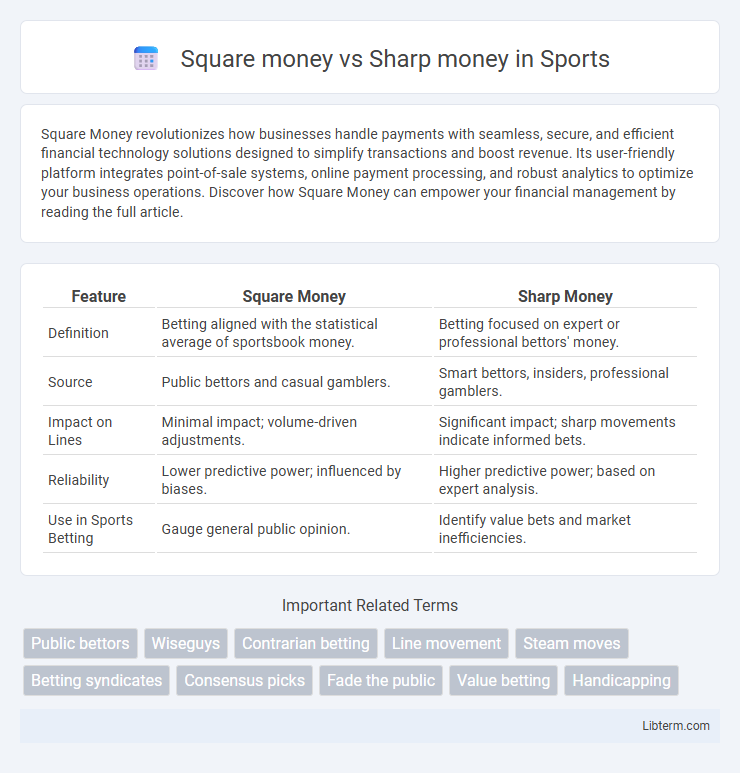Square Money revolutionizes how businesses handle payments with seamless, secure, and efficient financial technology solutions designed to simplify transactions and boost revenue. Its user-friendly platform integrates point-of-sale systems, online payment processing, and robust analytics to optimize your business operations. Discover how Square Money can empower your financial management by reading the full article.
Table of Comparison
| Feature | Square Money | Sharp Money |
|---|---|---|
| Definition | Betting aligned with the statistical average of sportsbook money. | Betting focused on expert or professional bettors' money. |
| Source | Public bettors and casual gamblers. | Smart bettors, insiders, professional gamblers. |
| Impact on Lines | Minimal impact; volume-driven adjustments. | Significant impact; sharp movements indicate informed bets. |
| Reliability | Lower predictive power; influenced by biases. | Higher predictive power; based on expert analysis. |
| Use in Sports Betting | Gauge general public opinion. | Identify value bets and market inefficiencies. |
Understanding Square Money and Sharp Money
Square money refers to straightforward, transparent bets where the odds are clearly defined and the stake matches the potential payout, making it easier for bettors to assess risk and reward. Sharp money involves bets placed by professional or highly skilled bettors who exploit inefficiencies in betting markets through in-depth analysis and advanced metrics, often influencing line movements. Understanding the distinction between square money and sharp money helps bettors identify market sentiment and make more informed wagering decisions.
Key Differences Between Square Money and Sharp Money
Square money refers to funds that are readily available and legally obtained without any risk or association with illegal activities, emphasizing straightforward and transparent financial transactions. Sharp money involves funds acquired through skillful, strategic, or sometimes aggressive financial tactics, often indicating a more sophisticated or risk-involved approach to handling money. The key difference lies in the origin and handling of funds, where square money is conventional and honest, while sharp money may involve clever maneuvers to maximize financial gain.
Characteristics of Square Bettors
Square money refers to bets placed by casual or recreational bettors who rely on intuition or emotions rather than detailed analysis, often leading to straightforward, low-risk wagers. Characteristics of square bettors include favoring popular teams or favorites, betting small amounts, and typically lacking deep knowledge of the sport or advanced betting strategies. Sharp money, in contrast, comes from professional or experienced bettors who use data-driven insights and sophisticated models to identify value bets and often influence market movements.
Traits of Sharp Bettors
Sharp bettors exhibit traits of advanced analytical skills, disciplined bankroll management, and an ability to identify value bets by exploiting market inefficiencies. Their wagering decisions are based on comprehensive statistical models, insider information, and timely market trends, leading to consistent profits. Unlike square money bettors who rely on intuition and public sentiment, sharp money moves markets by leveraging data-driven insights and precision timing.
How Sharp Money Influences Betting Lines
Sharp money significantly influences betting lines by reflecting the wagers of professional bettors with deep market insights and analytical models. Sportsbooks adjust odds quickly in response to sharp action to minimize potential losses, often moving lines to balance exposure based on these high-stakes bets. This dynamic response to sharp money creates more efficient and accurate betting lines that better represent true probabilities.
Impact of Square Money on the Market
Square money, characterized by exact payment amounts, reduces ambiguity in financial transactions, enhancing transparency and trust within the market. This precision accelerates transaction processing and minimizes disputes, leading to increased efficiency for businesses and consumers alike. The widespread adoption of square money fosters a more stable and predictable economic environment by promoting accurate pricing and consistent cash flow management.
Strategies Used by Sharp Bettors
Sharp bettors leverage advanced analytics, real-time market data, and deep understanding of game dynamics to identify value bets, exploiting discrepancies in sharp money versus square money patterns. They strategically place wagers ahead of major line movements to capitalize on information asymmetry and sharp market inefficiencies. By monitoring sharp money trends and adjusting bets accordingly, they systematically increase their expected returns and minimize risks in sports betting markets.
Common Mistakes Made by Square Bettors
Square money bettors often make the mistake of relying solely on intuition rather than analyzing sharp money trends, leading to less informed wagers. Ignoring line movements driven by sharp money can result in missed opportunities to capitalize on value bets and insider information. Failing to adjust bets according to sharp money shifts reduces the potential for maximizing profits in sports betting markets.
Identifying Sharp Money Movement
Sharp money refers to bets placed by professional or highly knowledgeable bettors who tend to identify value and predict outcomes accurately, often moving the line significantly in sports betting markets. In contrast, square money comes from casual or recreational bettors who typically wager based on popular sentiment rather than deep analysis. Identifying sharp money movement involves tracking sudden line shifts, especially early in the betting cycle, and monitoring key sportsbooks where sharp bettors are known to operate, signaling where informed money is being placed.
Maximizing Profits: Learning from Sharp Money
Sharp money consists of experienced professional traders who analyze market trends and data meticulously to identify profitable opportunities, maximizing returns through informed decision-making. Unlike square money, often comprising inexperienced or retail investors prone to emotional trading and delayed reactions, sharp money leverages timely information and strategic risk management to enhance profitability. Emulating sharp money strategies involves rigorous market analysis, disciplined trade execution, and continual adaptation to market dynamics to optimize profit outcomes.
Square money Infographic

 libterm.com
libterm.com